
‘NOMOPHOBIA’
Some people panic without their cell phone
10/21/2012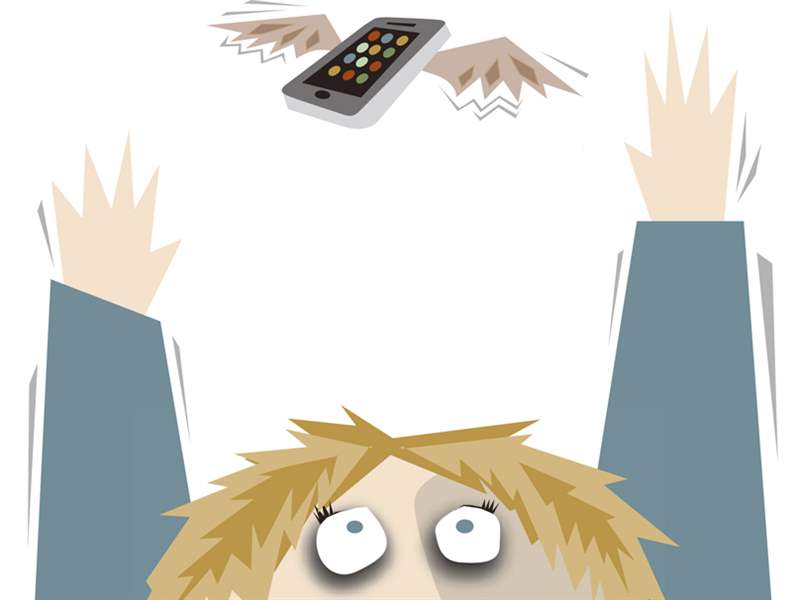
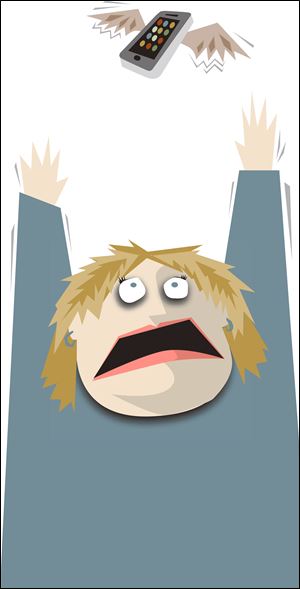
Shortly after surgery from giving birth to her second child, Sara Hegarty was groggy, but she knew what she needed.
Her phone.
“I got the baby latched on [breast feeding] and I started texting,” said Ms. Hegarty. There was, after all, great news to share, the baby’s name to announce, and photos of little James. News to share NOW.
Tips for Nomophobes
Do you, your loved ones, or coworkers think you’re too attached to your phone?
are some ideas about how to ramp it down.
Elizabeth Waterman, a psychologist at Morningside Recovery in Newport Beach, Calif., suggests setting aside time for family and friends during which phones are not allowed, as well as turning them off at night. Remember: the world turned before the invention of cell phones and will continue to turn when we put them down, she says.
It’s the cell-phone user’s responsibility to be inoffensive. Pay attention to etiquette such as turning it off or setting it on vibrate or Do Not Disturb when with others outside the home. You might think your ring tones are a hoot, but they’re likely to be disruptive to others.
When speaking face to face with someone, don’t take calls or send texts. Do not put the phone on a table during meals. Keep your voice down and mind the 10-foot-rule: during cell conversations, keep at least 10 feet from the nearest person. Put it away most social situations, including in check-out lines.
Reduce anxiety by never putting the phone down in a public place, keeping a spare charger at work or in the car, and backing up your address book regularly.
In counseling, a person significantly addicted to their phone would likely be taught how to get themselves to relax and methods for managing anxiety. Their phone might be taken away for an extended period during which they’d practice deep breathing and remind themselves that they are safe and not missing anything crucial.
— By Tahree Lane
“I can’t go anywhere without it,” she said. She’s got that in common with millions of others around the globe who include their phone on their don’t-leave-home-without-it list. Call it the spell of the cell.
The growing 21st-century compulsion to be connected was propelled by the addition of the Internet to smart phones, and it didn’t take long for the most avid users to become habitues. Indeed, there’s a term, nomophobia, for the anxiety felt when one is without their phone and the sense of panic when it’s lost. It’s derived from “no-mobile” technology, coined in 2008 during a study of cell-phone use among Britons commissioned by the United Kingdom Post Office.
Ms. Hegarty, 31, of West Toledo works as the co-host on the Morning Rush on 92.5, KISS-FM. At her husband’s request, she’s trying to break her habit of bringing the phone to the dinner table. Her phone attachment deepened considerably a few years’ back when the Internet arrived at her fingertips in the form of a BlackBerry.
“I never had to go to a computer.” People were so enamored, the BlackBerry quickly earned a nickname: CrackBerry, a reference to the highly-addictive drug. During his 2008 campaign, President Obama became known for his dependence on the BlackBerry.
A couple of months ago, Ms. Hegarty lost her iPhone 4 (which, along with the iPhone 5, was the drug of choice for most of those interviewed for this article). It was MIA for two-and-a-half hours. “I was panicky,” she said.
She downloaded a “find my phone” app on her husband’s phone, which triggers the lost phone to make a sound. Still no luck, until her husband, Shaun Hegarty, also in local media at WTVG-TV, Channel 13, suggested it might be in his car, where they found it under the seat.
“What if there’s an emergency?” said the mother of two. And therein lies the crux of the matter: What if someone needs me, something horrible happens, I miss something?
Addiction
In addition to “what if,” consider the many services a smart phone can provide: texting, tweeting, emailing, accessing Facebook, taking and sharing photos, receiving news bulletins, reading books, and listening to music. It’s a talking map, a watch, an alarm clock, an address book, a calendar, a calculator, a translator. A way to shop, pursue hobbies, order dinner, connect with people who share interests, check the bank balance, find a store or restaurant. It can be a television remote control and can direct your TV to record a program when you’re not home. A Zippo lighter held high at a rock concert. Oh, and as A.G. Bell intended, as a vehicle for vocal conversations.
Psychologist Elizabeth Waterman treats people who have addictions, including nomophobia, at Morningside Recovery in Newport Beach, Calif.
One might be addicted to their pocket-sized rectangle if they feel anxious or panicked when it’s left behind, lost, or on the fritz, she said. Other indications include checking obsessively for calls, texts, or emails; being unwilling to turn it off for an extended period of time; constantly making sure it’s within reach and the battery life is good; using it in inappropriate settings (bathroom, church, meetings, classes).
Physiological symptoms can be sweating, shaking, rapid heart rate, stomach in knots, and rapid, shallow breathing. Thoughts may race and people might act irrationally.
Counseling would be in order, Ms. Waterman writes, when one’s work, school, or social functions are significantly affected.
Always checking
Lauren Downey, a junior at Bowling Green State University, makes heavy use of her iPhone 4S for all the usual things as well as apps for everything from “guitar tuners to score-updates for my favorite teams from ESPN, even fantasy football. And my phone has led me to a huge career opportunity: I got a call from CNN broadcaster Carlos Diaz telling me I was one of 20 accepted into his broadcasting program in Indianapolis in 2013.”
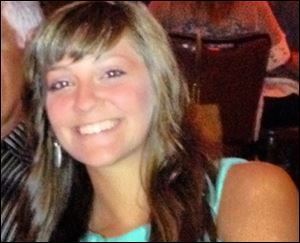
Lauren Downey, a Bowling Green State University junior, makes heavy use of her mobile phone.
A telecommunications major, she’s often trying to line up NASCAR drivers and experts to interview for her Full Throttle radio show (7 to 8 p.m. Tuesdays, 88.1, WGBU-FM and www.wbgufm.com).
She admits to checking messages during class but doesn’t set the phone on her desk as many students do. During a recent exam, she needed to focus all her attention so she set the phone to Do Not Disturb, which stores all messages. “The minute I walked out of that room I flipped that feature off,” said Ms. Downey, 20.
When a class has ended, many students check their phones. “People want to see if they’ve missed something. Some people, I think, are disappointed after a 50-minute class when they don’t have something on their phone,” said Ms. Downey, who’s planning to be a NASCAR broadcaster.
“I’m a big believer in phone etiquette,” she said, such as never having the ringer on in public or in class. She doesn’t text manually when driving but will speak voice messages into the phone that are sent as text.
Taking a break
Christopher Ankney took his first telephone call in six weeks recently (it was from this reporter).
“It came up as ‘blocked’ and I was intrigued,” he said. Text conversations are quicker and more efficient than voice conversations; the problem is not always being able to decifer the tone of the text.
The longest Mr. Ankney, 26, goes without using or checking his iPhone 4 during waking hours is 30 minutes. But it’s part of his job: he’s the social media specialist at the University of Michigan’s Ross School of Business, responsible for building relationships with people associated with the school via Twitter, Facebook, YouTube, LinkedIn, emails, and blogs. His daily text total is usually less than 100.
Mr. Ankney, a 2008 University of Toledo grad, was phoneless during a two-week European vacation two years ago. “I got a little anxious at the beginning, not having that connection to the world, but after the initial anxiety wore off it turned into a relief,” he said. “At some point, however, I would have sought out a connection.”
His need to be connected was far less six years ago when he spent two months in southern France without a phone but did have Internet access.
“I think it’s probably not a good thing to be as connected as I am,” he said, adding that it doesn’t seem to interfere with his face-time with people. “I don’t know if I’m addicted but it’s definitely a part of how I live my life.” It may only be a matter of time, he observes, before our ability to text will be programmed in a brain-implanted chip.
‘Totally uncomfortable’
Darlene Whitehead understands well the cell’s spell.
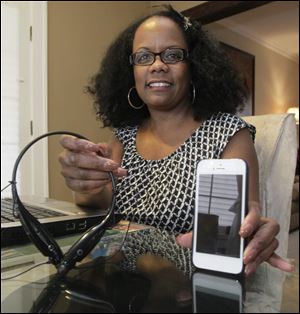
Darlene Whitehead, self-described phone addict, with her iPhone 5 and a bluetooth and radio device. She says she always has her phone or bluetooth at hand, whether she's at her computer, vaccuuming or doing other things around the house.
“I’ve got so many people who tell me I’m addicted to my phone,” said Ms. Whitehead, 44, a customer service representative. “If I went to lunch and I didn’t have my phone, I’d go back and get it.”
Not long ago, she forgot her phone when she went to an event about 45 minutes from her West Toledo home. “I was totally uncomfortable. I couldn’t concentrate or have fun.”
She admitted to being “a bit of a talker” and recalled feeling the first stirrings of love with her BlackBerry. She now uses the iPhone 5.
Jody Zink doesn’t want to miss anything in her occupation as a real estate agent or her personal life. Vacationing in rural Maine a few years ago, she couldn’t get a phone signal.
“I was kind of a mess. My phone is my lifeline to my business.”
She got her first cell phone 17 years ago and has an iPhone 5. She bought an iPhone as soon as it hit the market several years ago.
“I loved all the things it could do and I loved being one of the first,” she said. “And I’m sure it has contributed to my short attention span.”
“My whole life is in that phone,” she said, recalling her devastation at losing all her data three years ago. “Meltdown does not even begin to describe my reaction.” Now she backs up all of the information in her phone on a computer.
A lifeline
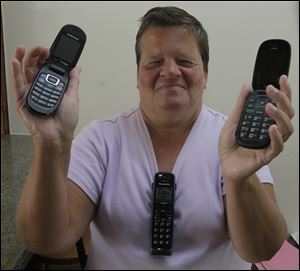
Betty Kasubski, of Maumee, who is blind, with the three phones she always wants with her, a cell, landline, and work phone.
Betty Kasubski often wears three phones at home: the landline’s handset, her cell, and a cell she uses for work.
“People know the phone is my lifeline. I’m blind, which doesn’t necessarily mean the phone is a lifeline, but I have about eight volunteer jobs and they all have to do with the phone,” she said. “I can’t stand the thought of leaving it somewhere.”
Expect to be put on hold at least once during a phone conversation with Ms. Kasubski, of Maumee. But she’s polite and efficient. She delights in getting calls and enjoys playing with ring tones.
“I love when my phone rings because I wonder who’s at the other end.” Texting, she adds, is a marvelous tool for people who are deaf.
“I always feel important when someone calls. I feel valued: ‘Oh good, someone wants to talk to me!’ ”
Contact Tahree Lane at tlane@theblade.com and 419-724-6075.